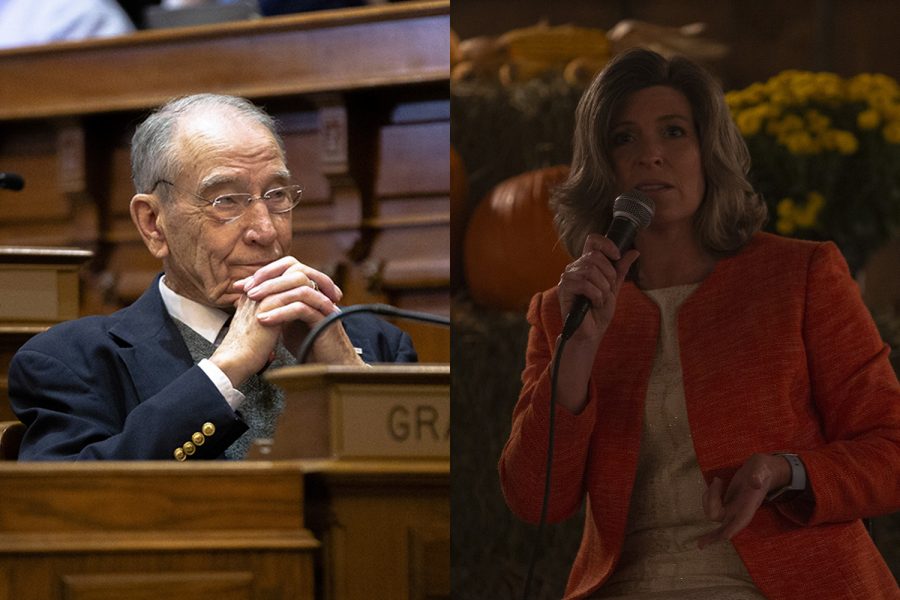Opinion | Supreme Court hearings highlight distrust in American politics
The blatant disregard for statements made in the past on the part of Iowan senators shows why the average citizen is distrustful of our elected representatives.
Photos of Sen. Chuck Grassley (Katina Zentz/The Daily Iowan) and Sen. Joni Ernst (Hannah Kinson/The Daily Iowan)
October 18, 2020
University of Iowa and Drake law schools recently sent a letter to Iowa’s Republican Sens. Joni Ernst and Chuck Grassley that lay out concerns on why they believe the Supreme Court nomination should have been held post-Nov. 3.
What was the response? A pre-written note from Grassley that thanked them for writing to their representative and nothing from Ernst.
Iowa politicians’ Supreme Court contradiction displays the bigger issue of increasing distrust in American government and threats to our democracy.
Previously, Grassley has been accused of hypocrisy after reversing his position that contradicts his 2016 statement that he would oppose holding a hearing for a Supreme Court nominee during an election year.
Instead of addressing the hypocrisy, he argued that the decision is no longer in his hands because he is no longer chairman of the committee.
Grassley’s disregard for addressing the evident contradiction he has made contributes to the ongoing issue of distrust in American government.
Recent studies have shown that only about 20 percent of the American population trust our federal government. This is very concerning because how do we expect our country to solve serious issues and protect us when we don’t have the faith that they can actually do it?
However, it’s no surprise that trust is so low. When we have situations where our politicians are being contradictory by not following through with their promises, we have no reason to trust them.
In fact, matters were made worse when Iowa Republican Party Spokesperson Aaron Britt wrote that Democrats should follow in the footsteps of Grassley and Ernst in ‘fulfilling their constitutional responsibility of giving a full and fair consideration.’
The contradiction isn’t about the constitution. It’s about how these politicians are breaking their responsibility of following through with their promises made to their constituents. It doesn’t take rocket science to see that no one trusts the government when politicians make decisions that are hypocritical, which depict dishonesty and disloyalty — qualities that have no place in our government.
In addition, Grassley’s statement affirming support for Trump from the American people through the expansion in 2018 of the Republican majority in the U.S. Senate
We are in 2020, not 2018. As of Oct. 12, Biden is leading Trump by 12.68 percentage points. This clearly depicts a lack of support from the majority of the American people, and if Grassley thinks the support of the majority is important, shouldn’t they honor their word to hold their hearing after the election to confirm this?
The lack of response from both Grassley and Ernst also demonstrates a current threat to American democracy. As senators, they are supposed to represent and listen to their constituents. How are we supposed to ensure democracy when politicians refuse to acknowledge concerns from the people that are holding them accountable for their actions?
A pre-written note from Grassley and lack of response from Ernst exhibits their unwillingness to listen to the people and instead follow their own and their party’s self-interest.
The current contradiction reflects poorly on our Iowa senators. However, what’s even more concerning is the fact that politicians are contradicting their statements and ignoring the people holding them accountable which threats our democracy and contributes to mistrust in the government.
Columns reflect the opinions of the authors and are not necessarily those of the Editorial Board, The Daily Iowan, or other organizations in which the author may be involved.















